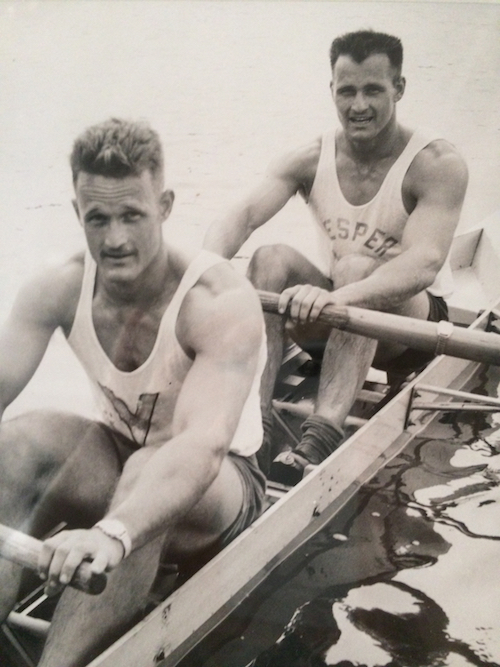Joe Amlong rowed in one of the most surprising eight-oared victories of the modern day Olympics. The year was 1964. For the previous 60 years, no club eight had competed in the Olympics. Just collegiate crews – Yale, Harvard, Cornell, and, of course, the University of Washington in the famous 1936 “Hitler” Olympics.
But John B. Kelly Jr. had the bold idea of putting together an Olympic crew out of Vesper. They were dubbed the “motley” crew–a bunch of old men, from an Olympics perspective: a 45-year-old Hungarian coxswain who had defected to the U.S. in 1956, two Yalies in their late 20s who were determined to defeat Harvard at the Olympic trials, a 35-year-old father of six, two young LaSalle College students, and Joe Amlong and his older brother Tom – self-described “Army brats” who mercilessly teased the Yalies. It was like a town-gown community, a boat at war with itself. And yet, they came home with gold from Japan. (You can read the surprising story in my book).

I interviewed Joe at the 50th reunion of the 1964 Vesper Olympians. By then, his brother Tom, had died. Joe himself died on July 1. Back in 2014, he told me how he and his brother had learned to row in Liège, Belgium, where their father was stationed; how they had fallen in love with a boat they weren’t allowed to row. “Both of us were fixated with the pair (without cox). It was a streamlined, elegant boat. But we were only allowed to row in a big, three-foot wide boat, a ‘yole.’ We were kind of fixated on rowing that boat but you had to be accomplished oarsmen to take it out.”
That fixation led them to row in college, to compete to try to get to the 1960 Olympics, and two years later they were drawn to Vesper to try again, though both by then were in the military.
“I wrote a letter to Kelly to see if I could be stationed in Philadelphia,” Joe told me. “We had to put in an application to train. We had to have somebody to endorse our request, that these guys were good enough. Kelly wrote a letter to the military to get us reassigned to the Defense Closing Supply in Philadelphia. We were assigned there in 1962. It was us pushing ourselves, but without Kelly, we would never have been able to get there.”
Initially, they trained in the pair, determined to take it to the Olympics. “We didn’t want anything to do with the eight. We thought it was mathematically too difficult to win – eight men rowing together all at the same time.”
According to two members of the crew (Bill Stowe and Emory Clark) who wrote books about the 1964 Olympics, there was plenty of banter, if not insults that went on in the boat. The Amlong brothers, they said, would call the others “pussies,” as if to goad them into better performance.
Joe, however, told me, “There was never any real animosity in the boat. Talk was more like what they now call bullying. We said things like, ‘You couldn’t row your way out of a paper bag.’ “
There was some tension with his brother, too. “I got married in August 1963,” Joe said. Tom “got so mad, he said ‘You’ll never concentrate on rowing and sex will weaken you!’” That was the thinking, still, at that time.
Joe also talked about the physical toll of rowing. “As a young oarsman, I’d pray to God that I could bear the suffering to get through. It’s excruciatingly painful. As a young rower, I’d say, ‘God help me.’ As an older rower, I would say, ‘This guy is going to pass me over my dead body.”
As for his motivation for going the distance to the Olympics: “My motivation? It’s always a bit selfish. You want to gain glory.” As for finally agreeing to join the eight: “It was nationalistic at that time. The Cold War was at its height. Winning in the eight seemed more important from a nationalistic standpoint.”